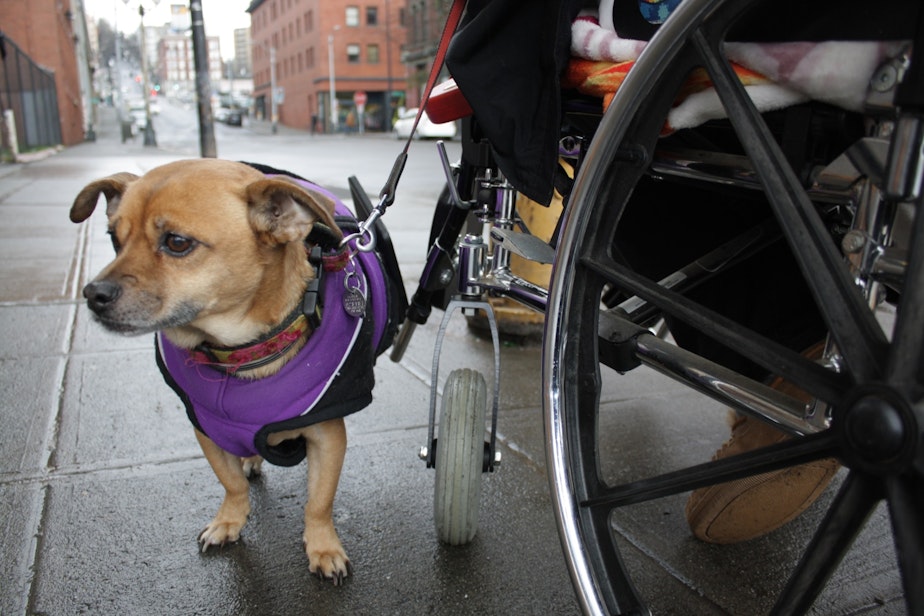Why Pets Are Welcome At This Seattle Homeless Shelter

Genie is a homeless woman who lives in downtown Seattle with her dog, Chewie. He’s half terrier, half Chihuahua, and he’s named for Chewbacca, the Star Wars character.
“He’s probably more Yoda than Chewbacca in his disposition, but he looks like a baby Wookiee to me,” Genie says.
Genie is allowed to bring Chewie into homeless shelters because Chewie is a service animal. But she’s unusual. Most homeless people with animals end up sleeping outside at night, because their pets aren’t allowed in.
That’s why King County will now allow pets to join their owners at a new Seattle homeless shelter for men. The shelter, at 420 4th Avenue in Seattle, has 50 beds. It opened on Saturday
It’s one way the county is chipping away at the barriers people say keep them out of shelters, said Anthony Wright, facilities director for King County.
Sponsored
“Frequently when service staff people go out and talk to homeless people with pets, they say, 'Hey, look, I’m faced with this decision: I leave my pet behind or I go to the shelter,’” Wright said.
It’s not unusual for people living on the streets to develop strong connections to animals. Dogs can provide protection and companionship during times of great vulnerability.
Wright said he doesn’t expect the animals to cause any trouble.
“Typically the pets just lie down with their owners and sleep,” Wright said.
But the 50 beds at this shelter won’t make a huge impact. Because there are thousands of people sleeping on the street in Seattle and King County. They have lots of reasons for staying out of the shelters. Not just pets, but work schedules and mental health issues.
Sponsored
Still, it’s something to curb the growing number of unsheltered homeless people in Seattle. More tents line the highways now than before, and Seattle Mayor Ed Murray declared homelessness an emergency.
On Monday, Genie and Chewie were outside the Chief Seattle Club in Pioneer Square. Genie was in a wheelchair, and Chewie wore a purple vest.
Related: There Are More Dogs Named Frodo Than Fido In Seattle
Genie wouldn’t give her real name, because she is worried about her husband hurting her again.
“I don't want him to find me,” she says.
Sponsored
But she shared her story, which begins with the first time Chewie saved her life – when her husband attacked Chewie.
“When he attacked Chewie, that’s when I got the heck out. Because he can’t protect himself,” she says.
Genie said she had blamed herself for her husband’s anger. When he hurt Chewie, she realized the abuse wasn’t her fault.
“It’s like having a child,” she says. “You make a responsibility for an animal, you take care of that animal.”
Genie had a tough choice when she left: Bring Chewie or her sleep apnea machine. She chose Chewie, even though her sleep apnea machine could save her life.
Sponsored
At first, Genie couldn’t find a shelter that would take dogs, so they slept on the street.
She found a shelter that allowed Chewie in – many shelters allow dogs the first night, assuming they are service dogs. They ask for paperwork later.
But Chewie drove her crazy – he kept waking her up. Someone noticed the pup was waking her when she stopped breathing – that’s how bad her sleep apnea was.
Genie saw a doctor who put her in touch with someone researching service dogs. That person documented Chewie’s behavior, which led to him being designated as a service dog. It took paperwork and determination, but it was worth it, because now he can join his mom at the shelter.
Just like the dogs at the new downtown men’s shelter.

